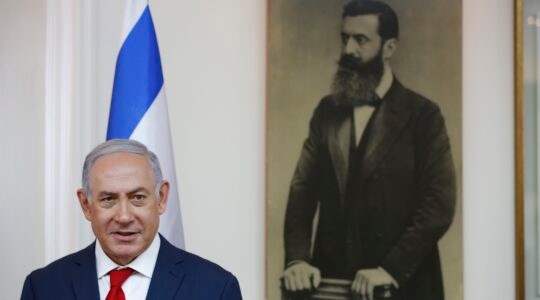JERUSALEM (JTA) – After the long-awaited final report of the Winograd Commission of inquiry into the Second Lebanon War was published last week, all eyes turned toward Israeli Defense Minister Ehud Barak.
Barak, the Labor Party leader, was the one man whose withdrawal of his party from the governing coalition could topple Prime Minister Ehud Olmert, whose wartime performance was the subject of much criticism in the report.
But after several days of soul-searching, Barak declared Sunday that he had decided to stay on in the government, and although he said he would work for early elections, he gave no inkling of any timetable.
Ironically, Barak, who was not part of the government during the Lebanon war, became the focus of Israelis’ protests against the government’s wartime conduct.
Likud opposition politicians, bereaved parents and army reservists campaigning for Olmert’s ouster all latched onto a promise Barak made last May in the run-up to Labor’s leadership primaries. Speaking at Kibbutz Sdot Yam, Barak had vowed that if Olmert did not leave office when Winograd published his report, Barak would press for early elections.
In the lead-up to the release of the final report Jan. 30, anti-government protesters camped out outside Barak’s home, demanding he keep his word.
But on Sunday Barak said he had decided to stay on as defense minister because of the serious security challenges Israel faces from Gaza, Hezbollah, Syria and Iran – and out of a need to continue to rehabilitate the IDF, which was heavily criticized in the report.
The report found that both the military establishment and the government failed in the years leading up to the war and during the war itself, which the report said was seriously lacking in coherent strategies. The report also faulted Olmert’s performance but said he made his decisions, albeit flawed ones, with the country’s best interests at heart.
That gave Olmert’s coalition critics, like Barak, wiggle room to stay in the government.
“I know I may pay a political price for this decision,” Barak declared after announcing he will keep Labor in the government. “But there is a country and an army that are much more important than me.”
The Likud was sharply critical of Barak and described his arguments for staying on as “self-serving excuses.” IDF reservist protesters said Barak apparently “didn’t care about responsibility or his own credibility.”
The anti-government alliance of right-wing parties, bereaved parents and reserve soldiers intends to continue its protests to try to whip up a critical mass of public opposition Olmert will be unable to ignore.
This is what happened following the Agranat Commission’s report on the 1973 Yom Kippur War. Although that report blamed the IDF and not the political echelon, a vigorous postwar protest movement eventually forced then-Prime Minister Golda Meir and then-Defense Minister Moshe Dayan to resign.
Most observers, however, believe that a similar scenario in the present circumstances is unlikely.
The Winograd report pulled no punches. It said that in making the decision to go to war after the July 12, 2006 cross-border raid in which Hezbollah militiamen killed three Israeli soldiers and kidnapped two others, the government did not consider alternatives to war; did not define clear war aims; was indecisive about committing troops to battle; did not make adequate preparation for a ground operation, and, when it finally decided on one, it was a case of too little too late.
The commission also points to a string of systemic failures: a lack of strategic thinking; an unprofessional decision-making process; a wrong-headed military doctrine, and poor interface between the top political and military echelons.
So how did Olmert survive with his job intact? There are two main reasons.
One, the commission makes no “personal recommendations” about removing anyone specific from office, prevented from doing so by Supreme Court appeals made by lawyers for the politicians and IDF generals. The court gave the commission the choice of sending warning letters to people compromised by its findings – or not to attach personal blame at all. To avoid lengthy legal proceedings that could have delayed the release of its findings indefinitely, the commission decided on the latter course.
Second, the anti-government protesters made a major tactical error: They focused their entire campaign against Olmert’s performance during the last 60 hours of the war, arguing that he ordered a final ground operation, in which 33 soldiers were killed, for self-serving political reasons. When the commission found that Olmert had acted reasonably and in good faith, even though the operation failed to achieve its goals, the opposition against him was deflated.
This “public acquittal” enabled Olmert to rally Kadima Knesset members around him and head off any potential internal rebellion. It also gave Barak the leeway he needed to release himself from his Sdot Yam pledge to quit the Olmert government.
There is also a fundamental party-political reason for Olmert’s survival: Neither he nor Barak wants elections anytime soon, which polls show the Likud’s Benjamin Netanyahu would win easily.
A Yediot Acharonot poll taken after the Wingorad report’s release showed that 30 percent of Israelis want Netanyahu as prime minister, 18 percent want Olmert and only 14 percent want Barak. A similar poll in Israel’s daily Ma’ariv had Netanyahu at 37.5 percent, Barak at 19.1 percent and Olmert at 14 percent.
Although the public’s main focus has been on Olmert’s battle for political survival, the commission’s strongest language was reserved for the IDF’s lackluster performance. The commission singled out three major conceptual failures: a misguided concept that the war could be won by airpower alone; a systematic and deliberate downsizing of the land army, including a reduction in training; and a self-defeating concern for casualties that led to missions not being carried out, and, as a result, soldiers nevertheless being put at risk.
The IDF has not waited for Winograd to make much-need changes. For the past year and half, it has been hard at work remedying its shortcomings. The generals claim that today the IDF is a very different army from the one in 2006, but they acknowledge that there is still a lot of work to be done – the reason Barak cites for his staying on as defense minister.
There is, of course, a deeper question about what the 610-page Winograd report really means for Israel.
For some shrewd observers like Haaretz’s Ari Shavit, it is “a sad book about a nation that is flying into a storm with an empty cockpit.”
But for others, like former defense minister Amir Peretz, it is “a wake-up call that came not a moment too soon.”
To put the question more bluntly: Does Winograd reflect a nation in decline, as its enemies claim, or a vibrant, self-critical society with inherent powers of self-correction and regeneration, as Israelis would like to believe?
JTA has documented Jewish history in real-time for over a century. Keep our journalism strong by joining us in supporting independent, award-winning reporting.





